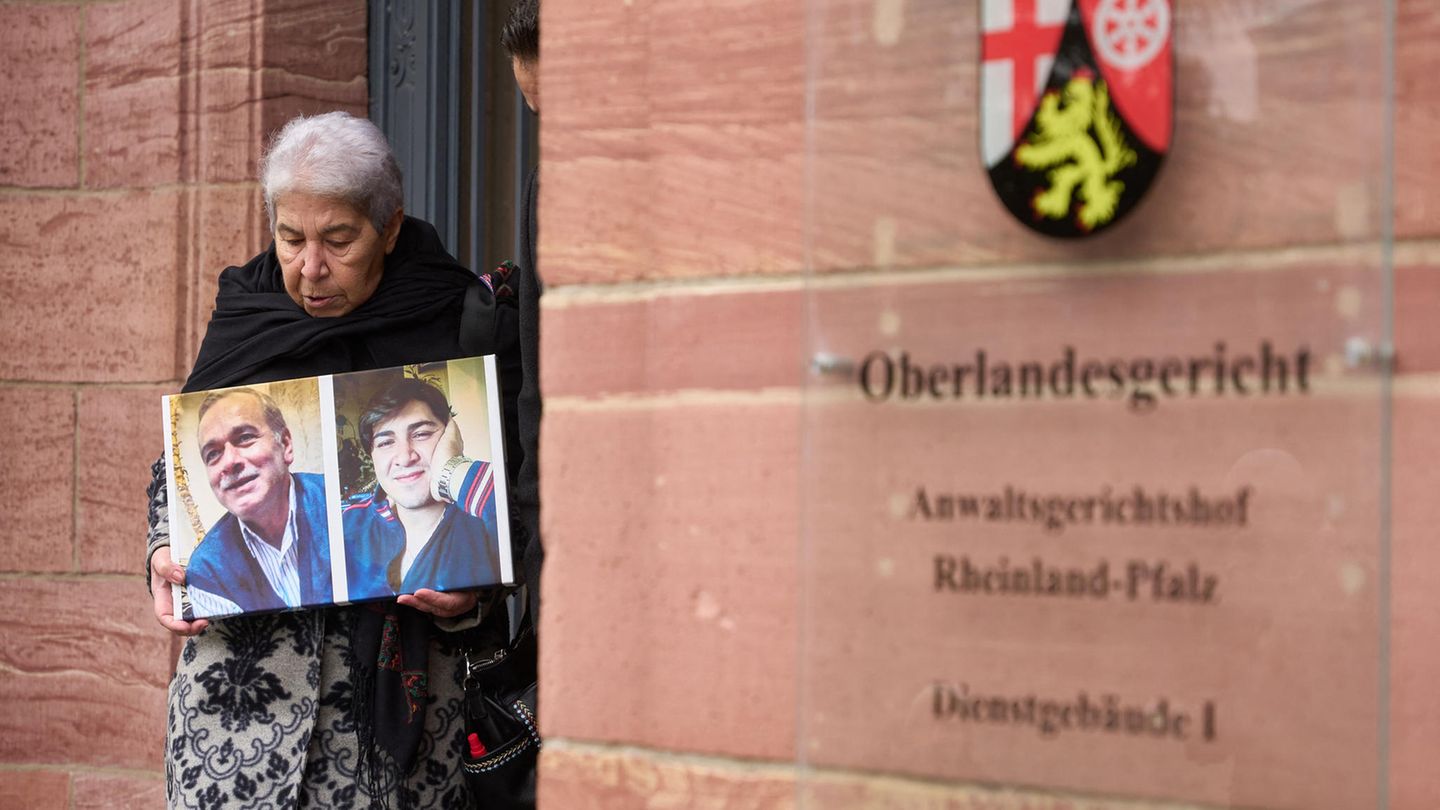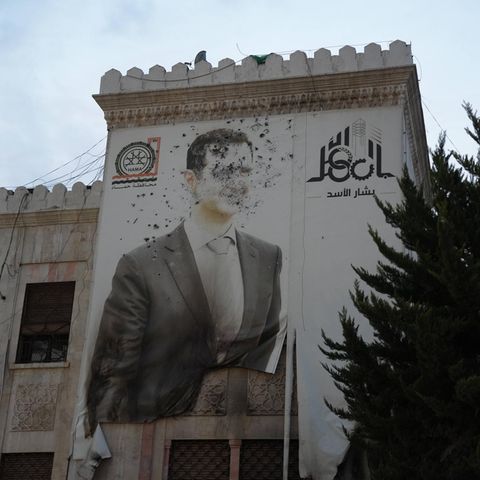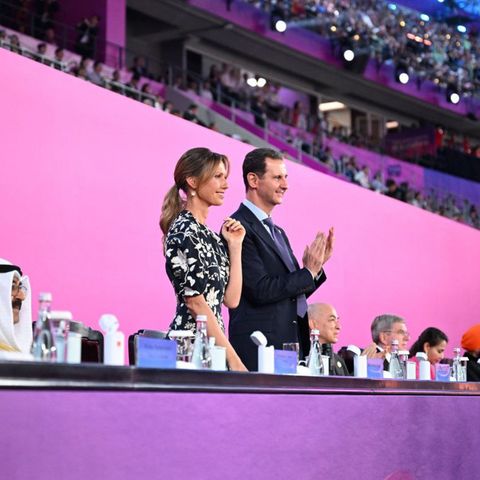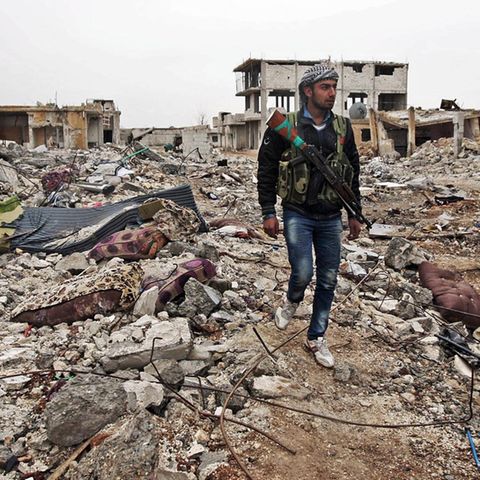On site
Syria demonstration in Berlin: About a woman who became the center of joy
Copy the current link
Fadwa Mahmoud lives in Berlin and has been missing her husband and son, who disappeared in Syria under Assad’s regime, for years. Now she has hope.
Fadwa Mahmoud is a short woman in her late 60s with short gray hair and soft features. On this rainy December day she is standing on Oranienplatz in Berlin-Kreuzberg, with around 5,000 people demonstrating around her. Fadwa Mahmoud is something like the secret center of joy. Someone is constantly coming up to her, congratulating her, hugging her. Some people hardly want to let go because of the joy.
They know Mahmoud from her years of fighting for Syria’s political prisoners – the more than 100,000 people who have disappeared into the Assad regime’s underground prisons since 2011; People who were tortured and killed en masse.
People like Mahmoud’s husband or her son. Mahmoud doesn’t know where they are being held or whether they are still alive. Nevertheless, she says she was overjoyed that day. “It’s like a dream come true.”
What many here hardly thought possible has happened: the Syrian dictator Bashar al-Assad was overthrown and after more than 50 years the regime came to a sudden end. In the early morning of December 8th, the rebels of the Islamist group “Hayat Tahrir ash-Sham” managed to take the Syrian capital Damascus and drive out the dictator. He and his father represent leaden decades of state oppression and violence, the full extent of which is only now coming to light.
They fled from Assad, now they are celebrating
After the failed Syrian revolution in 2011, millions of people fled the country to escape war, torture and the catastrophic economic situation. Almost a million live in Germany – and euphorically celebrated the fall of Assad in many cities on Sunday. They were celebrations of confidence, but also of pain. Many people were thinking about the people they had to leave behind years ago: their families, their friends, the disappeared and the dead. Like Fadwa Mahmoud on Oranienplatz in Berlin-Kreuzberg.
Since the fall of Assad, people across Syria have begun opening prisons, freeing political prisoners and searching for the disappeared.
Mahmoud has not yet heard from her husband or son. But for the first time in more than ten years, the chances are good that she could have some certainty about her fate.
“We’re waiting,” she says. She’s been doing this for years. “If I hear today that they are free, I will travel to Syria tomorrow.”
Oranienplatz continues to fill up, and the streets around it are also full of Syrians. Every now and then a new wave of revelers pushes out of the subway station, and the roar of a chant keeps approaching. “Freedom for the people, whether you want it or not, Assad!” they shout, and: “Raise your head, you are Syrian.”
The flag of the revolution: in the air and painted on faces everywhere
Everywhere is the flag of the Syrian revolution, green, white, black with three red stars. It is swung, rests on shoulders, is painted on faces. Old people and families mix with hipsters and young people, all saying “Mabruk” – Arabic for congratulations. Strangers exchange ideas about where they come from in Syria.
On the bus, a man says to a child: “Inshallah you will travel to Syria and get to know the country.” Traveling to Syria: Some people who are celebrating Assad’s downfall in Berlin-Kreuzberg are now thinking about this.
Hossam, 42, has lived in Germany for almost ten years. The studied historian works here as a social worker. He really wants to travel to Damascus to see his mother and brother. They haven’t held each other’s arms since 2014. But return to Syria permanently? “I built a life here, worked, paid taxes, had a child who doesn’t know Syria. However, I have nothing there.”
Hossam hopes for Syria’s reconstruction, including international support. He says: “Then there will definitely be a lot of jobs created in the country.” But he also says: “I’m afraid of the future. You just have to look at the experiences of Egypt, Libya or Iraq. People there were also happy and disappointed. The transition can take a long time.” Then he takes his little daughter in his arms and turns to the dancing crowd, waving a flag.
“When Syria is safe, I’ll go back,” says Mohammed, smoking a cigarette on the sidelines of the demonstration. The 34-year-old electrician wears a bun and a lumberjack shirt and has the Syrian revolutionary flag tied around him like a cape. In 2012 he fled from military service and lived in Turkey for a long time. He has only recently been in Berlin. “Nobody is here as a tourist or because they want to,” says Mohammed. He longs for his family, his friends and neighbors, for the streets of his hometown Aleppo. “We still have to be patient,” he believes, but he is confident that the overthrow has so far been non-violent and respectful. “The Assad regime has sown interfaith conflicts to divide us.” Now it is important that the people stick together.
“No matter what happens, it gets better”
A little further on, Vinda from Damascus is standing, pushing a stroller with her twins back and forth. “No matter what happens, it gets better,” she says. After all, the people in their homeland “developed a political consciousness through the years of war. We will not get involved in sectarian agitation.”
Vinda was forced to leave Syria in 2011 after receiving death threats after political posts on Facebook. Like many others, she cannot put into words how she felt that day. “It’s something you dream about all your life but don’t believe it could come true.” The oppression didn’t just start in 2011, she says, but 50 years ago. The 34-year-old has not yet experienced a Syria without Assad.
“The fear was firmly anchored in Syria,” says Moustafa Gumrok, who came to Oranienplatz with a group of older men. He is 74 years old and has lived in Berlin for more than fifty years. He studied here, got married, had children and grandchildren, and founded a football club for people who are new to the country. He wears a knitted scarf in the colors of the Syrian flag around his neck.
“We’ve all been so depressed over the last 13 years,” says Gumrok. “At that time we were very close to overthrowing Assad. But then Russia and Iran put him back up again.” Like many others, Gumrok tried to fight for a free Syria from abroad. “But we never thought we would see this day.” For Gumrok, Germany is now as much a home as Syria. But when the situation on site is stable, he would like to travel to his hometown of Aleppo with his friends. He grins with anticipation as he thinks: “We want to have breakfast there in the café near the citadel.”
Overwhelmed with grief
Yasmina Ahmed*, a 33-year-old lawyer from Damascus, also came to Oranienplatz. She was awake all night. “Nobody’s sleeping right now,” she says. “Time no longer plays a role for Syrians.” Early in the morning of this historic Sunday, when it was clear that the dictator Bashar al-Assad had fallen, she went with friends to the Syrian embassy in Berlin. They wanted to replace the flag.
“The police were confused,” says Yasmina, laughing. “That was the message from Syria, they said. And we replied: But there is no longer a Syrian regime.”
In the afternoon, while she was still on the way to the demonstration, Yasmina sent a selfie: the young woman with brown curls and a nose piercing beamed into the camera, while a friend next to her showed the peace sign. “We are very happy,” she wrote.
Now she stands here with thousands of compatriots and celebrates the end of an era that seemed to many like an endless nightmare. But joy is just one of many feelings associated with this change.
In the evening Yasmina is overwhelmed by grief and fear. Videos of the liberation of political prisoners are circulating on the Internet. For the first time, they show the interior of the prisons where tens of thousands of political prisoners have disappeared for years. Torture, sexual violence, extrajudicial executions, inhumane prison conditions: all of this was omnipresent there, and countless people did not survive their imprisonment.
When Yasmina talks about it, she cries uncontrollably: “It looks exactly like what we’ve heard for years. It’s terrible. I’ve never seen anything like it. In Sednaya Prison, people are stuck three floors underground, including women and children. I don’t give a shit who will rule Syria and how. I just want to know that these people are safe.”
She is also not interested in Assad at this moment. “We’ll get him, but we should focus on the prisoners now, not the perpetrator. These thoughts only lead to revenge.” Yasmina is sure that it will take a lot of time to come to terms with the suffering of the Syrian population. “I see the trauma in each and every one of us,” she says. “We’re only now allowing it to come to the surface.”
*Name changed by the editors
Source: Stern
I have been working in the news industry for over 6 years, first as a reporter and now as an editor. I have covered politics extensively, and my work has appeared in major newspapers and online news outlets around the world. In addition to my writing, I also contribute regularly to 24 Hours World.







